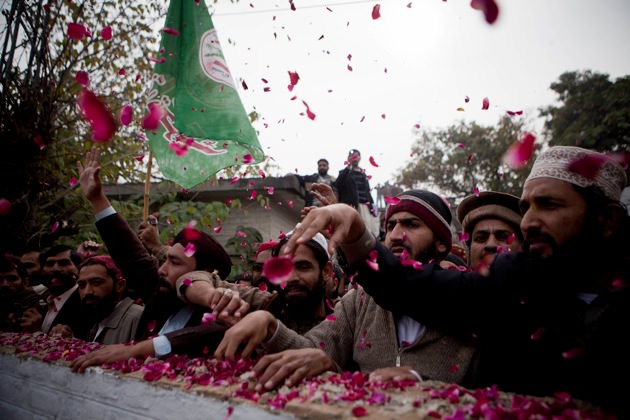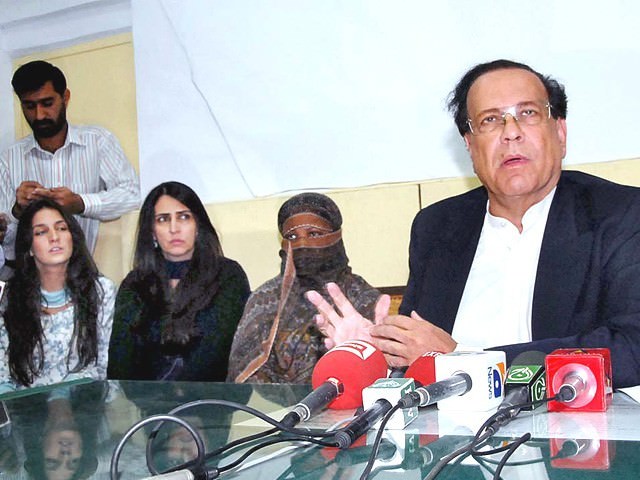In his great book of reportage on the revolution in Iran, Shah of Shahs, Ryszard Kapuscinski describes that mysterious tipping point when a demonstrator loses his fear of the Shah’s security forces and refuses to listen when the once all-powerful police order him to step back. Suddenly, all involved realize that the power of the state to cow people into obedience has been broken. I was reminded of that episode by the tragic January 4 murder of Salman Taseer, governor of Pakistan’s Punjab Province, by a member of his own security detail, in a public shooting just a mile from the presidential palace in Islamabad. As with Kapuscinski’s demonstrator, the killing seemed to mark an epochal shift in the political landscape—though here the poles are reversed. In the case of modern Pakistan, it is now the tyranny of fear that is reaching into the heart of the political system. It has become extremely hard to see how anyone can pull the country’s political culture back from the brink.
It’s not just that Taseer was an advocate of a secular, pluralistic Pakistan who stood up, on a number of occasions, to the forces of intolerance—a man who was, on various occasions, imprisoned, tortured, and beaten for publicly defending the rights of minorities and the urgent need for freedom of expression. It’s not just that he was the head of Pakistan’s richest and most populous province. And it’s not just that he was an example of someone from humble origins who managed to rise to one of the highest offices in the country by dint of his own hard work.
No, what’s particularly worrisome about this case is the failure of the Pakistani political system to protect one of its own. When the state surrenders its monopoly on violence to those who stand outside of it, it can no longer be described as a functioning state. Pakistan’s political institutions are supposed to represent the many different parties and groups that participate in the country’s civic life, yet now state power is succumbing to the demands of an exclusionist view of the world that can benefit only a particular few. In the weeks and months preceding his assassination, Taseer had been courageously campaigning—in the face of direct threats—to overturn an anti-blasphemy law that had been frequently abused to condemn people of minority faiths.
Yet no one within Taseer’s own political party—the Pakistan People’s Party, whose members include the current president, Asif Ali Zardari, and which is supposedly a bulwark of this system—has defended his efforts in any meaningful way. (Zardari did not even attend his funeral.) Five hundred scholars of the Barelvi movement—the branch of Sunni Islam followed by many Pakistani muslims that has often claimed to stand for a more tolerant vision of Islam and has condemned Taliban violence in the past—have greeted his killing by praising his assassin.
As a member of Taseer’s own elite security detail, his murderer, Malik Mumtaz Qadri, was a man who decided that his oath to protect an official of the state was superseded by a “higher” oath that commanded him, instead, to kill. That Qadri had been assigned as a bodyguard to Taseer despite his dismissal several years ago from a police unit because of his extremist views raises yet further questions. All of this is why I find myself agreeing with Huma Imtiaz: “This is the end. There is no going back from here, there is no miracle cure, there is no magic wand that will one day make everything better.”
I am not a Pakistani. But I can’t help feeling that the killing of Salman Taseer is a calamity for everyone who lives in the country—including the people who are now strewing flowers at the feet of the man who allegedly pulled the trigger. Those who support the takfiri worldview don’t seem to understand that this is an ideology that cedes the definition of “true Islam” to the self-declared defenders of religion—and that these definitions shift according to the political wind, to selfish agendas and narrow factional interests, rather than to the uncorrupted dictates of faith. And that means that those who consider themselves right-minded believers today can easily find themselves on the wrong end of a Kalashnikov tomorrow.
The West, and especially the United States, should also take notice. It is time for policymakers in Washington to understand that Pakistan is not simply a vexing sideshow to the war in Afghanistan. Pakistan—populous, chaotic, and nuclear-armed—needs to be taken seriously in its own right. An imploding Pakistan promises immense pain and turmoil to itself and the world at large. Let’s hope that this realization doesn’t come too late.
Advertisement
An earlier version of this post appeared on Gandhara, Radio Free Europe’s blog about Afghanistan and Pakistan.




